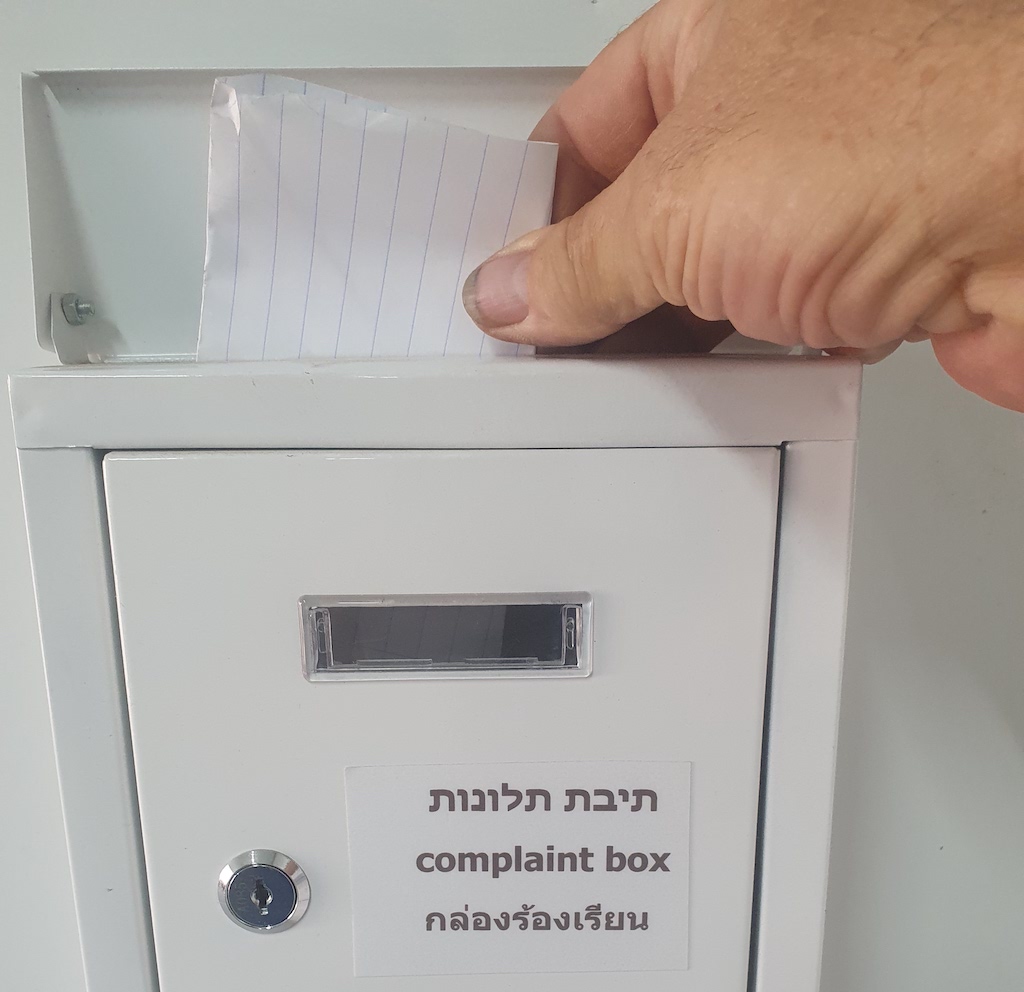An effective grievance management – the WHAT, WHY and HOW

A functional reporting system for grievances is an increasingly important matter in global supply chain management and compliance. New legislation requires European and North American brands and retailers to manage grievances in their supply chain. While establishing a grievance management system might seem like a straightforward process, the reality of implementing it in various sourcing markets is more complex. Factors such as work culture, lack of knowledge and misunderstanding of compliance requirements can hinder the establishment of effective grievance management. In this article, the features, background and importance of grievance management, as well as solutions to establishing effective grievance management in global supply chains will be discussed.
What is grievance management?
The Merriam-Webster dictionary defines a grievance as “a cause of distress (such as an unsatisfactory working condition) felt to afford reason for complaint or resistance”. “Grievance” may also be defined more generally. The grievance is defined as the Cambridge dictionary as “a complaint or a strong feeling that you have been treated unfairly”. Whatever definition you prefer, grievances appear where someone has something to complain about (such as a worker in a workplace). An organisation can handle complaints through the establishment of effective grievance management.
Why is the establishment of grievance management important?
Grievance management is important to be able to learn of existing issues and take actions to correct them. Any organisation that is interested in growth needs to be willing to face and tackle grievances in order to improve and develop its business practices.
Grievance management is increasingly important in order to meet new compliance requirements in global supply chains
The increasing number of regulations regarding compliance in global supply chains poses complex challenges to European and North American businesses and their suppliers. However, this can also be viewed as an opportunity. Effective grievance management is important to meet compliance requirements in global supply chains and can be used to improve one’s market position.
The German supply chain compliance law “Lieferkettensorgfaltspflichtengesetz – Gesetz über die unternehmerischen Sorgfaltspflichten zur Vermeidung von Menschenrechtsverletzungen in Lieferketten” (LkSG) regulating compliance in global supply chains of German companies was passed in June 2021 and will take effect from February 2022. Effective grievance management is an essential aspect of the due diligence requirements specified by the LkSG. The new law will have a deep impact on the global supply chains of Western businesses. This is also an opportunity for suppliers around the world to position themselves as pro-active partners to German buyers by proactively developing and offering solutions – acting instead of reacting.
Similar legislation has been passed in various countries, to require proper grievance management. The EU is preparing even stricter regulations and these are expected to be passed in the near future. The Netherlands, France and the UK have already passed similar legislation requiring grievance management. In the US, California Transparency Act and Dodd-Frank act regulate compliance in supply chains, including grievance management. At the G7 summit, leading industrial nations reaffirmed the importance of Human Rights compliance in global supply chains. Society also now has higher expectations regarding human rights and environmental protection, and this will only increase compliance requirements in supply chains further.
Therefore, supply chain transparency, risk assessment and grievance management are crucial aspects to meet international legal and customer requirements.
The German Supply Chain Due Diligence Act directly addresses the need for grievance management
The aim of the German Supply Chain Due Diligence Act (the “German Supply Chain Act”) is to improve the protection of human rights. Companies in Germany also have a responsibility to help protect human rights. They must ensure that human rights are respected in their supply chains. Environmental issues are also at the forefront of focus as environmental and human rights are closely connected (e.g., in the case of polluted water). The law sets out clear and realisable requirements for corporate due diligence, thus creating legal certainty for companies and affected persons. Establishing an effective and practical grievance management system is one of the core requirements described in the law and is an essential component to meet other regulatory requirements. Grievance management is also necessary for sustainable compliance management in supply chains of the future, as only with an effective grievance management system can impacts, risks and issues regarding non-compliance be mitigated, reduced and prevented.
The German Supply Chain Act requires the following (one of the requirements being is an effective grievance mechanism):
- Risk Management
- Definition of Responsibilities
- Implementation of A Regular Risk Assessment Process
- Definition of A Human Rights Policy
- Preventive Measures
- Remediation
- Effective Grievance mechanisms
- Due Diligence of Suppliers
- Documentation and Reporting
Section on Grievance management of the German Supply Chain Due Diligence Act
§ 8 of the German Supply Chain Act directly addresses the requirements regarding grievance mechanisms, as follows:
§ 8 Grievance mechanism
(1) The company shall ensure that an internal company grievance procedure in accordance with Paragraphs 2 to 4 is in place to enable persons who are directly affected by economic activities in the company’s own business area or by economic activities of a direct supplier or whose protected legal position may be violated, as well as persons who have knowledge of the possible violation of a protected legal position or an environmental obligation, to point out human rights and environmental risks or violations. If a notification is received from a person directly affected, the receipt must be acknowledged. The company shall discuss the facts with the whistleblowers. It may offer a procedure for amicable settlement. The company may instead participate in corresponding external grievance management, provided it meets the following criteria.
(2) The company shall establish rules of procedure in writing.
(3) The persons entrusted by the company with the implementation of the procedure must offer a guarantee of impartiality, in particular they must be independent and not bound by instructions. They shall be bound to secrecy.
(4) The company must make clear and comprehensible information on accessibility and responsibility and on the implementation of the grievance procedure publicly available in a suitable manner. The grievance procedure must be accessible to potential users, maintain confidentiality of identity and provide effective protection from being disadvantaged or penalized as a result of a complaint.
(5) The effectiveness of the grievance mechanism shall be reviewed at least once a year and on an ad hoc basis if the company anticipates a significantly changed or significantly expanded risk situation in its own business area or with its direct supplier, for example due to the introduction of new products, projects or a new business area. The measures are to be updated immediately if necessary.
Challenges of establishing grievance management
Grievance management is crucial to meet current and future international legal and customer requirements.
However, in many sourcing markets, the culture around complaints at the workplace is rudimentary. Even though criticism is often constructive and necessary for positive improvements, values like harmony, obedience and endurance are prioritised in many organisations. Another reason for the absence of effective grievance management is a widespread lack of knowledge and insecurity among management and workers. The channels for workers (like email addresses or complicated platforms optimised for desktop use) are often not appropriate. Workers mistrust the system due to past negative experiences such as their work contracts being terminated if they make a complaint. This makes them unlikely to speak up and use complaint hotlines.
It is important that grievance management is considering local culture
The handling of grievances is increasingly important for international supply chains who must follow a variety of standardised requirements. To manage grievances efficiently it is important to understand the culture of a country, and the organisational culture within a factory. Grievance management plays an important role, as it is a direct instrument of handling conflict between workers and management. In competitive climates, a positive work atmosphere in the company can become a decisive advantage. While establishing effective grievance management is a challenge, it should also be seen as an opportunity to improve the organisation beyond satisfying compliance requirements. Numerous studies have shown that effective grievance management significantly improves worker satisfaction, motivation and loyalty, quality of work, reduces absenteeism and leads to greater organisational productivity.
Pre-requisites in a factory for a functioning grievance management system
- Grievance manager on-site
- Worker training to make sure, rights and responsibilities and the grievance management is understood
- Hotline
- Case management including grievances handling, remediation, documentation
Benefits of a functioning grievance management system for suppliers:
- Better access to western markets
- Less employee turnover
- Higher productivity
Benefits of a functioning grievance management system for brands and retailers:
- Necessary proof and documentation of compliance for supply chain legislation Minimierung von Risiken
- Risk minimisation
- More resilient supply chain

